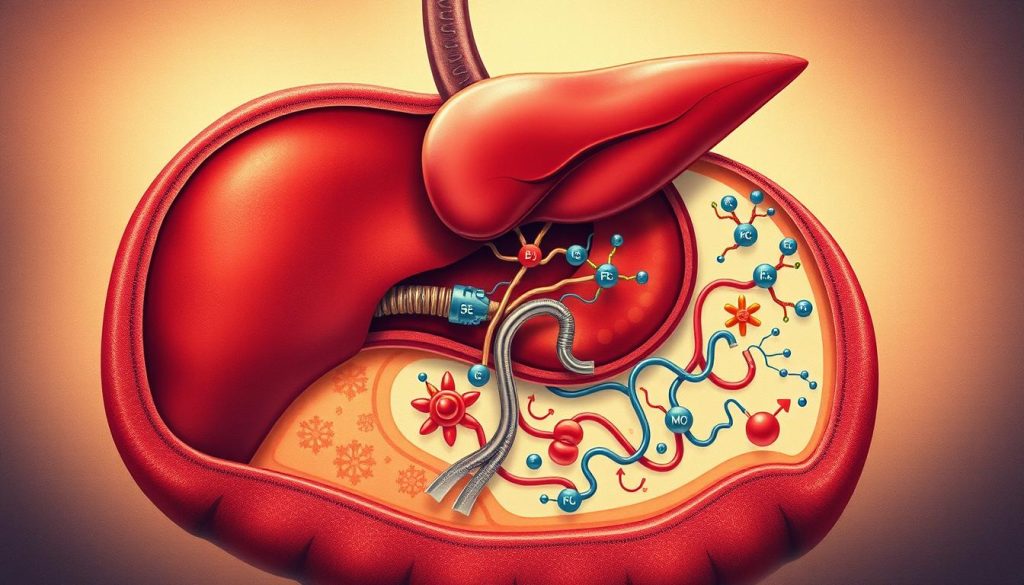Your body has an internal clock that does more than just tell time. It controls when you feel hungry, sleepy, or full of energy. Knowing how your internal clock affects your metabolism can change how you take care of yourself.
Metabolic health and circadian rhythm are linked to every cell in your body. Hormones, digestion, and energy levels follow natural patterns. When these systems work together, you feel your best.
When you eat or exercise matters as much as what you do. Your body processes food differently at different times. Good sleep quality boosts your metabolism the next day.
But modern life often messes with these natural patterns. Artificial lights, late meals, and irregular schedules can upset your internal clock. This can affect your overall health in unexpected ways.
Understanding Metabolic Health
Metabolic health is more than just about weight. It’s about how well your body works. Think of your metabolism as the engine of your body. When it’s working right, you feel full of energy, keep your blood sugar stable, and lower your risk of serious diseases.
What is Metabolic Health?
Metabolic health is about how well your body uses nutrients and keeps energy balanced. It’s a complex system that turns food into energy. Your metabolism has three main parts that work together smoothly.
First, glucose regulation controls your blood sugar levels. Your pancreas releases insulin to help cells use glucose. When this works well, you have steady energy all day.
Second, lipid metabolism deals with fats. It breaks down fats from food and stores energy for later. It also helps manage cholesterol and hormones.
Third, cellular energy production happens in your mitochondria. These tiny powerhouses turn nutrients into ATP, the energy your cells need. Healthy mitochondria mean better energy and health.

Importance of Metabolic Health
Good metabolic health is key to preventing chronic diseases. When your metabolism is healthy, you’re less likely to get type 2 diabetes, heart disease, or obesity. This is because your body keeps blood sugar and cholesterol levels healthy.
Metabolic flexibility is also important. It means your body can easily switch between using glucose and fat for energy. When you’re flexible, you can go longer without feeling tired or hungry.
Your metabolism also affects your mood and brain clarity. Stable blood sugar prevents energy crashes that can make you feel irritable and foggy. People with healthy metabolisms often have better focus and energy all day.
Common Indicators of Metabolic Health
Doctors use several markers to check your metabolic health. These markers help spot problems early.
- Blood glucose levels show how well you manage sugar after eating
- Insulin sensitivity indicates how well your cells use insulin
- Waist circumference shows visceral fat levels around your organs
- Blood pressure reflects your heart health and circulation
- Triglyceride levels show how you process dietary fats
Your doctor might also check HDL (good) cholesterol and inflammatory markers. These tests give a full picture of your metabolic health. Regular checks help catch changes early.
Knowing these indicators lets you take charge of your health. Small improvements in glucose regulation and other markers can lead to big benefits. The good news is that metabolic health can improve with better nutrition, exercise, and sleep.
The Role of Circadian Rhythm
Chronobiology shows how our internal clocks affect our health. These natural cycles keep our bodies working well. Your circadian rhythm is like a conductor, controlling hunger and immune system peaks.
Research warns that messing with these cycles can harm health. Knowing how your biological clock works helps you make better choices for your health.
What Makes Your Internal Clock Tick
Your circadian rhythm is a 24-hour cycle that controls body functions. It doesn’t just control sleepiness. It also manages hormone production, body temperature, and repair processes.
The suprachiasmatic nucleus in your brain is the master clock. It coordinates clocks in your body’s organs and tissues. Each part of your body has its own timing system that must sync with the main clock.
Light exposure is key to keeping these rhythms in sync. Blue light from the sun tells your brain it’s daytime. This helps reset your biological clock every day.
How Your Body Clock Affects Your Health
Your circadian rhythm impacts more than sleep. It affects metabolism, immune function, and mental performance. When it’s working right, you’re energized when you should be and sleepy when you should rest.

Disrupted rhythms can cause health problems. These include weight gain, diabetes, depression, and weakened immunity. Shift workers and frequent travelers often face these issues due to irregular sleep patterns.
The Science of Sleep and Wake Patterns
Two hormones control your sleep-wake cycles: melatonin and cortisol. Melatonin makes you sleepy in the evening. Cortisol helps you wake up and stay alert in the morning.
Chronotypes explain why some are morning larks and others are night owls. Your genes determine when you naturally want to sleep and wake up.
Knowing your chronotype can help you plan your day better. Working with your natural rhythms improves health and quality of life.
The Connection Between Metabolic Health and Circadian Rhythm
Your body’s natural rhythm and metabolism work together. This partnership affects your energy, hormones, and weight. When they align, it supports your health.
Metabolic processes follow a 24-hour cycle. Your body prepares for activities based on internal signals. These rhythms influence hormone production and nutrient absorption.
How Circadian Disruptions Affect Metabolism
Disruptions in your internal clock harm your metabolism. Shift workers and travelers often gain weight and feel tired. This is because their bodies get confused about when to process energy.
Insulin sensitivity changes throughout the day. It’s highest in the morning and lowest at night. This affects how your body handles glucose.
Research shows night workers are 40% more likely to get metabolic disorders. Their bodies struggle with unnatural eating and sleeping times. This leads to hormonal imbalances that last even on days off.

Eating late at night disrupts your metabolism. It forces your body to process food when it’s less efficient. This can lead to high blood sugar and fat storage. Just one night of bad sleep can make you 25% less sensitive to insulin the next day.
The Impact of Sleep on Metabolic Health
Quality sleep affects two important hunger hormones. Leptin decreases with less sleep, while ghrelin increases. This makes you feel hungrier and crave unhealthy foods.
When you’re tired, your brain thinks you’re in danger. It makes you want to eat more and store energy. People who sleep less than six hours a night are 30% more likely to be obese.
Sleep also affects cortisol, a hormone that controls glucose. Poor sleep can raise cortisol levels, harming insulin sensitivity and leading to belly fat. This makes it harder to sleep well, creating a cycle of metabolic problems.
But, improving sleep quality can quickly fix metabolic issues. Just one week of good sleep can improve glucose tolerance and hormone balance. This shows how closely our circadian rhythms and metabolic health are connected.
Nutritional Timing and Circadian Rhythms
Your body’s internal clock affects when you feel hungry and how well you digest food. This connection is key to chrono-nutrition. Knowing this can help you choose the best times and foods for your health.
Chrono-nutrition shows that when you eat matters as much as what you eat. Your body’s digestion, hormone production, and hunger control follow daily patterns. These rhythms can help or hinder your health goals, depending on your eating habits.
Best Times for Eating
Eating your biggest meal in the morning is best. Your body is most efficient at processing food then. So, eat most of your calories at breakfast and lunch.
Having breakfast within an hour of waking boosts your metabolism. Your body’s cortisol levels are higher in the morning, helping with digestion. This also prevents late-day cravings for unhealthy foods.

Finish dinner at least three hours before bedtime. Eating late can ruin your sleep and slow down digestion. Your body temperature drops in the evening, making it hard to digest heavy meals.
Eating a big breakfast, a moderate lunch, and a light dinner fits your body’s natural rhythms. This pattern helps you sleep better, keeps blood sugar stable, and aids in weight management.
Foods That Support Metabolic Health
Some foods help your body’s natural rhythms and metabolism. Tart cherries have melatonin for better sleep. Complex carbs like oats and quinoa give steady energy without spiking blood sugar.
Protein-rich foods are best in the morning for muscle repair and neurotransmitters. Lean meats, eggs, and legumes keep you full longer. They also boost your metabolism because they’re harder to digest.
Leafy greens and nuts are high in magnesium for better sleep and glucose metabolism. Omega-3s from fish and walnuts reduce inflammation and support hormone production. These nutrients keep your body’s rhythms in check.
- Morning: Protein-rich foods, complex carbohydrates, healthy fats
- Afternoon: Balanced meals with lean proteins and vegetables
- Evening: Light proteins, magnesium-rich foods, tart cherries
- Avoid: Caffeine after 2 PM, heavy meals within 3 hours of bedtime
Intermittent Fasting and Circadian Alignment
Intermittent fasting can reset your body’s rhythms if done right. Eating in an 8-hour window and fasting for 16 hours aligns with hormone cycles. It also improves metabolic flexibility.
Time-restricted eating works best during daylight hours. Eating from 8 AM to 4 PM maximizes metabolic benefits. This timing uses your body’s natural insulin sensitivity.
Fasting lets your digestive system rest and focus on repair. It improves insulin sensitivity and supports weight management. But, the timing of your eating window is more important than the fasting length.
Start with small changes to adjust to fasting. Gradually extend the time between dinner and breakfast. Then, narrow your eating window. This helps your body adjust without affecting sleep or energy.
Exercise and Circadian Rhythm
Working out at the right time can boost your metabolism. Your body makes cortisol in the morning to wake you up. This hormone level drops as the day goes on, making certain times better for exercise.
Exercising with your body’s natural rhythm can improve how you handle sugar and burn fat. Research shows that timing your workouts right can lead to better blood sugar control and fat loss. It’s all about knowing how your body reacts to exercise.
When to Exercise for Optimal Results
Morning workouts from 6 AM to 9 AM are best. Your cortisol levels are high then, giving you energy for intense workouts. This also helps keep your body’s internal clock in sync.
Studies show that morning exercise can improve insulin sensitivity for up to 24 hours. Your muscles use glucose better, keeping blood sugar stable. This is great for people with diabetes or prediabetes.
Working out in the late afternoon, from 3 PM to 6 PM, can also be good. Your body temperature is higher, which might improve your performance and lower injury risk. But, avoid hard workouts close to bedtime to keep your sleep good.
Evening workouts should be light. Activities like walking, yoga, or stretching can help you relax without messing with your cortisol rhythm. These activities also help you sleep better while still offering metabolic benefits.
Types of Exercise for Metabolic Health
Resistance training builds muscle, which increases your resting metabolic rate. More muscle means you burn more calories all day. Aim for 2-3 strength training sessions a week, focusing on big muscle groups.
Cardio exercises improve insulin sensitivity and heart health. Activities like brisk walking, cycling, or swimming make your cells better at using glucose. Even 30 minutes of moderate cardio can be very beneficial.
High-intensity interval training (HIIT) combines strength and cardio in short sessions. These workouts are especially good in the morning, fitting with your natural energy. HIIT sessions are short but offer lasting metabolic benefits.
Consistency is key, not perfection. Pick activities you enjoy and can stick with. Even those with irregular schedules can benefit from regular exercise, helping stabilize their disrupted circadian rhythms.
Stress and Its Effects on Metabolism
Chronic stress changes how your body uses energy and keeps time. It leads to lasting metabolic changes. Your body wasn’t made for the constant stress of today’s world.
Stress impacts many parts of your body. It affects how you sleep, eat, and burn calories. The hormone cortisol is key, controlling your metabolism.
How Stress Disrupts Circadian Rhythm
Stress hormones can mess up your internal clock. High cortisol levels all day disrupt your sleep-wake cycle. This messes with body temperature, a key sign of health.
Your body temperature usually follows a daily pattern. It goes up in the morning, peaks in the afternoon, and drops at night. But stress can flatten this curve, making it hard to know when to be awake or sleep.
Stress also messes with “peripheral clocks” in your body. These clocks in your liver, muscles, and fat cells work with your brain’s clock. When they’re out of sync, your metabolism gets confused.
This confusion makes it hard for your body to process food right. Your cells might not respond well to insulin, making blood sugar hard to control. You might also store more fat, especially around your waist.
Managing Stress for Better Health
To break the stress-metabolism cycle, you need specific strategies. Morning sunlight helps reset your internal clock. Try to get 10-15 minutes of natural light within an hour of waking.
Evening routines are also key. Dim lights and avoid screens for an hour before bed. This helps your body make melatonin and sleep better.
Mindfulness practices can fight stress hormones. Deep breathing, meditation, or yoga calm your body. They help lower cortisol and support your metabolism.
Regular meal times help manage stress effects on metabolism. Eating at the same times each day helps your body’s rhythm. Avoid eating late at night to help your body recover.
Exercise is great for stress, but timing is important. Morning or afternoon workouts help regulate cortisol. Evening workouts might make it hard to wind down.
Improving sleep quality helps manage stress. Better sleep means more stable cortisol levels, which supports your metabolism. Create a cool, dark sleep space and keep regular bedtimes, even on weekends.
Practical Tips for Supporting Metabolic Health
Simple daily habits can change your metabolic health. They should match your body’s natural rhythms. Start with small, consistent changes that support your sleep-wake cycle.
Success comes from predictability. Regular sleep, eating, and activity patterns boost your metabolism. This approach takes patience but leads to lasting health and energy improvements.
Establishing a Consistent Sleep Schedule
Your sleep-wake cycle is key to metabolic health. Going to bed and waking up at the same time every day helps regulate hormones. This consistency is more important than the exact hours.
Choose a realistic bedtime for seven to nine hours of sleep. Stick to it, even on weekends, to keep your body’s internal clock in sync. If your bedtime varies, gradually adjust it by 15 minutes each night.
Make your bedroom cool, dark, and quiet for sleep. Remove electronic devices an hour before bed. Blue light from screens can disrupt your sleep-wake cycle.
Develop a relaxing bedtime routine. This could be reading, gentle stretching, or a warm bath. Consistent pre-sleep activities strengthen your circadian rhythm.
If you work shifts or travel, adapt these tips. Shift workers should keep the same sleep schedule on days off. For travel, adjust your sleep time a few days before to reduce jet lag.
Nutrition Tips for a Healthy Metabolism
Timing your meals supports your metabolism and sleep-wake cycle. Eating at regular intervals keeps blood sugar stable and aligns with your body’s rhythms. Your digestive system works best when it knows what to expect.
Start with a protein-rich breakfast within two hours of waking. This meal boosts your metabolism and keeps you energized. Include foods like eggs, Greek yogurt, or lean meats for muscle maintenance and fullness.
Eat your largest meal at midday when your metabolism is most active. Your body processes food better during daylight. Save lighter meals for evening to avoid sleep quality issues.
- Eat your last meal at least three hours before bedtime
- Limit caffeine intake after 2 PM to prevent sleep disruption
- Stay hydrated throughout the day but reduce fluids before bed
- Choose complex carbohydrates over simple sugars for steady energy
- Include healthy fats like avocados and nuts to support hormone production
Consider intermittent fasting to align eating with your circadian rhythm. A 12-hour eating window can improve metabolic flexibility. This gives your digestive system time to rest and repair overnight.
Meal prep on weekends for consistent nutrition during busy weekdays. Having healthy options ready prevents impulsive, unhealthy food choices that can harm your metabolic health goals.
When social events or work obligations disrupt your eating schedule, get back to your routine as soon as possible. One off-schedule meal won’t ruin your progress, but consistency leads to lasting improvements.
Track how different foods affect your energy and sleep quality. Some people feel more alert with higher protein, while others prefer moderate carbohydrates. Listen to your body and adjust accordingly.
Hydration is crucial for metabolic function. Drink water throughout the day but reduce it in the evening to avoid sleep disruptions. Proper hydration supports all metabolic processes in your body.
Small changes in your daily routine can lead to big improvements in metabolic health over time. Start with one or two strategies at a time. Building sustainable habits takes time, but the benefits to your health and energy make it worth it.
Future Research Directions
The study of circadian biology is growing fast. It’s opening new ways to understand how we stay healthy. Scientists are looking into how our unique internal clocks can lead to better treatments for each person.
Emerging Studies on Circadian Biology
Recent studies are looking at melatonin and how it affects our blood sugar. They found that when we take melatonin can change how our bodies use insulin. They’re also studying how our genes affect how we respond to our internal clocks.
Now, we have devices that track our blood sugar in real time. They show how our internal clocks affect our blood sugar levels. This technology helps find patterns that we might miss with regular tests.
Potential Innovations in Metabolic Health Management
Light therapy devices are being made to help fix our internal clocks. These tools could help people who work at night or travel a lot stay healthy.
Chrono-pharmacology is another area of interest. It’s about giving medicine at the right time to match our natural rhythms. This could make treatments for diabetes and other health issues better.
Workplaces are also getting involved. Companies are trying out special lighting and flexible work hours that fit our natural rhythms. This is to help keep employees healthy.
Even with these new ideas, the basics are still key. Good sleep, eating on time, and managing stress are still the best ways to keep our metabolism healthy.

